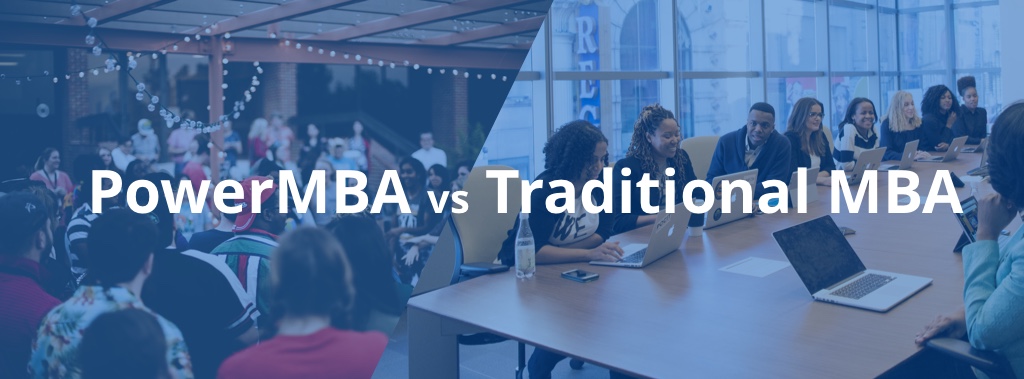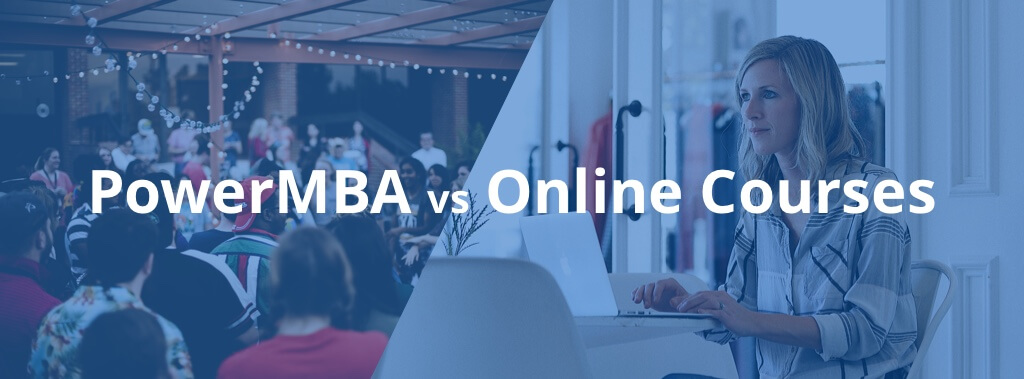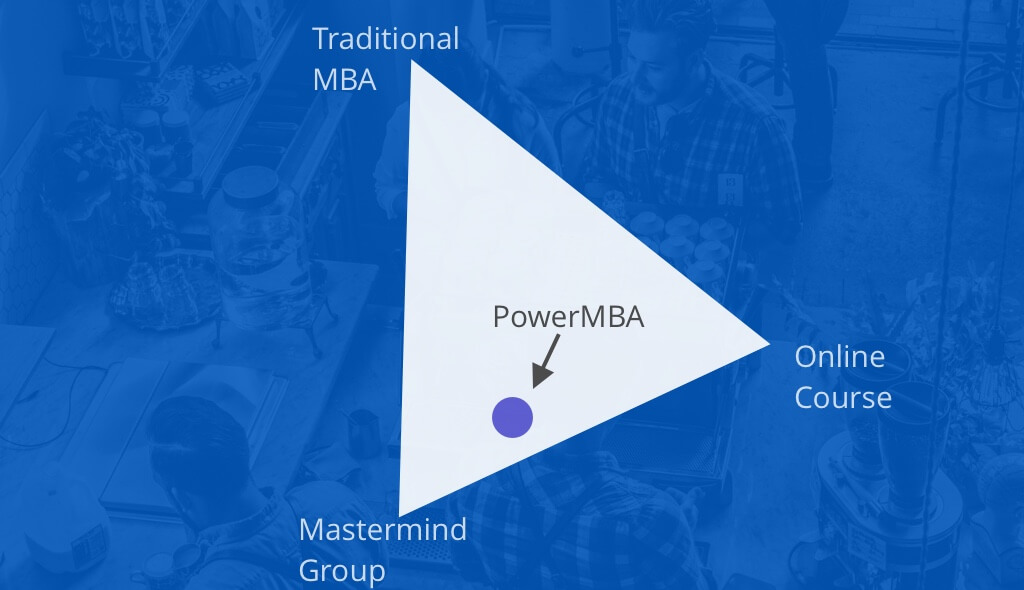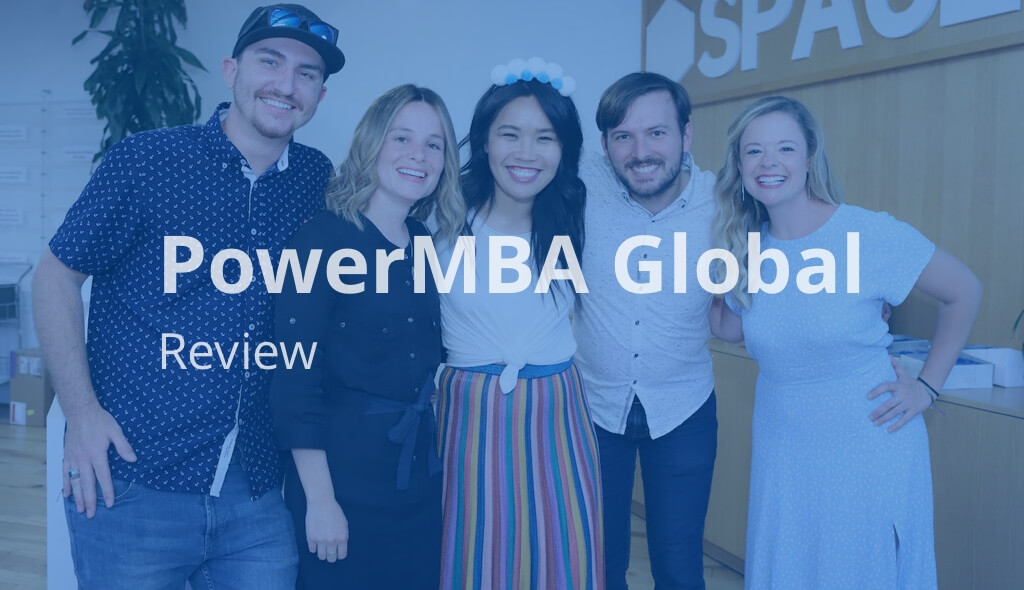ThePowerMBA Global is far from traditional — in fact, it’s only been available outside Europe since 2020.
I was in the first US-based cohort, and this review is based on my personal experience as a PowerMBA student over the past year.
- A comprehensive overview of costs and drawbacks of ThePowerMBA program.
- A detailed comparison between ThePowerMBA and other MBA alternatives like premium communities, MOOCs, and Executive Training Programs.
- Where ThePowerMBA fit into my career development as a Director-level operator.
Is the PowerMBA Global a good value?
In my case, ThePowerMBA Global was a reasonable value for the education modules, but didn’t deliver too much in terms of network quality and industry-specific learning as you would expect from something with “MBA” in the name.
Overall, The PowerMBA is more like a cohort-based course and less like a traditional “MBA” as the name describes. In short, it’s an MBA alternative — but not an MBA replacement.
If you're primarily looking for an accredited MBA, I would look closely at a low-cost remote MBA like Quantic — however, it's quite challenging to qualify for. ThePowerMBA is not accredited, and that should factor into your decision.
Compare the price-to-value ratio below to see how PowerMBA compares to other business education products:
| Program | Price | Brand Recognition | Accreditation |
|---|---|---|---|
| MOOC | Free | High | Degree or certificate not granted |
| Online Course | $49-2000 | Low | Typically unaccredited |
| Private community | $49-6000 | Mid | Typically unaccredited |
| PowerMBA | $800-1000 | Mid | Unaccredited |
| Cohort-based online course | $2000-8000 | Low | Unaccredited |
| Quantic | $5000+ | Mid | Accredited |
| Ivy League Executive Training Program | $35,000-60,000 | High | Typically unaccredited |
| Traditional MBA | $100,000-200,000 | High | Accredited |
What is the value of a program like PowerMBA?
Overall, the PowerMBA is highly tailored to mid-level management at tech companies. If you’re a few years into a tech career and transitioned from tactical to strategic management work at the Manager/Director level in the past couple years, you’re their target market.
It’s less valuable if you’re already at the VP or C-Suite level, or if you’re still struggling to get your foot in the door. At this level, the coursework is not tactical enough to be helpful for entry-level roles.
Access to decision-makers and fast-growing leaders at FAANG companies is high-value if you’re in management, marketing, or sales. But it may not be worth the ticket price if you’re in a more technical role.
Again, I would also suggest ThePowerMBA as more of a backup to accredited programs like Quantic.
Pros & Cons of the PowerMBA
- Low cost compared to MBAs or other cohort-based courses
- Celebrity guest lectures from large tech companies like AirBnB and Google
- Q&A with successful tech executives on top of pre-recorded course material
- Lifetime access to community and networking aspects of course
- Not accredited, and therefore not the right choice if you're looking to stack certifications or logos on your resume
- High-level course content makes it a good fit for middle-management but not a clean fit for entry-level or VP-level professionals
- Courses not taught by well-known leaders, contrary to the way it's presented on their site. Most coursework is taught by teachers, not business titans.
Where PowerMBA Fits in the Post-Grad Landscape
At a high level, you’re paying for three things with a post-grad program:
- Networking and community
- Recognized logo or certification for your CV
- High-value coursework
Note that I put the actual coursework last on the list.
The placement isn’t accidental; in my opinion, networking is by far the strongest value in any MBA or cohort-type program. Networking opportunities is where PowerMBA provides the highest value relative to the alternatives.
As I’ll describe in detail below, the PowerMBA delivers an amazing network at a reasonable price, and the coursework is solid as pre-recorded material goes.
The only place it falls short is the brand recognition — but to be fair, that’s not what they’re selling at such an affordable price point.

PowerMBA vs Traditional MBAs and Executive Education Programs
The second-most important part of any paid program is the recognition.
I know several C-Suite executives who have gone through “executive education” programs like Harvard (HBS) specifically to put the logo on their LinkedIn.
For those already in a high six-figure role or running a seven-figure-plus company, $40,000 to put Harvard’s logo behind your name is a screaming good deal.
Brand recognition is where the PowerMBA falls short. At a fraction the cost of an Ivy League exec program, I personally feel it’s reasonable.
All told, the PowerMBA experience is about 3% of the price of an executive education program like those offered by Harvard, or through Emeritus (disclosure: Emeritus is an agency client I’ve worked on through Rootstrap).
But if you’re after a logo more than an education, you should look to the traditional business schools. There is not yet an online or “modern” (AKA affordable) equivalent that is widely recognized.

PowerMBA vs online courses and MOOCs
When it comes to coursework, the PowerMBA is decent but I’d price it closer to $450 if it didn’t have the community and cohort aspects. The modules are well-produced and it feels more like watching an engaging documentary on Netflix than sitting down for MBA material.
However, if the only thing you’re after is coursework, I strongly recommend you check out some of the MOOCs (Massive Open Online Courses) along with similar Ivy League courses freely streamable on YouTube and elsewhere.
Actually, you should definitely check these out anyway. Access to elite advanced coursework is one of the true marvels of the internet age and too few people actually take advantage.
A few of my favorite MOOC-type courses:
- Valuations 101 from Aswath Damodaran (NYU)
- Strategic Management from Robert Austin (Copenhagen Business School)
Compared with other online courses, ThePowerMBA is on the expensive side. Here are a couple similar courses that I've gotten a lot out of for much less money:
- Practical business skills: Monthly1K Course with Noah Kagan
- MBA-style business theory: MBA Mapped Business Course with Toppa
I’ve even seen some professionals — even some quite successful ones — list these as logos on their LinkedIn accounts in lieu of actual degrees:

Anyway, back to the topic at hand…
In terms of material depth, I’d describe the PowerMBA as being similar to ultra-practical business books like the Personal MBA. However, the slant is much more into tech.
My favorite modules were the ones that went deep on topics like SaaS revenue optimization and analysis of large platform and FAANG companies. This is where the access to actual C-Suite strategists at the big tech companies shined through.
Is the PowerMBA a good MBA alternative?
The PowerMBA is not an MBA alternative. It has more in common with a cohort-based online course than a traditional MBA.
To that point, several of my cohort members had actually already completed a formal MBA before joining the PowerMBA. For them, the value was in ongoing educational material and access to the local networking events. (I cannot stress enough how valuable this is, especially if you’re in a tech hub like Los Angeles, New York, or San Francisco.)

Several other of my cohort members have since gone on to start a formal MBA, or plan to do so when they’re closer to the VP level. For them, the value was in building community and testing the waters.
For me personally, I’ve been quite vocal in my opinion that MBAs are overpriced — in the US and Australia, at any rate. Check out my byline on Business Insider for more on that topic.
Schools like Harvard and Yale actually make a huge chunk of their revenue on post-grad programs, and it shows in the price tag. $78k/year for undergrad isn’t exactly a loss-leader, but it’s small change compared to the cost-in-cost-out of operating graduate, business school, and executive training programs.
All that said, I may well do an executive education program somewhere with strong brand and community recognition like MIT or Harvard in the future. At a certain point, logos are worth paying for.
The PowerMBA is just a better fit for this stage of my career.
Impact of the PowerMBA on My Career
The PowerMBA has had three big impacts on my career progression to date:
- Added 19+ contacts at FAANG and multinationals to my personal roladex.
- Shown my employer that I take my management education seriously.
- Given me a well-rounded exposure and vocabulary around scaled tech strategy.
While the impact is nowhere near what I’d get from a traditional MBA, EMBA, or accredited program like Quantic, it’s still better than nothing. It is also way less selective, in that virtually anyone with interest can qualify provided you work in tech.
Paid communities like the PowerMBA social platform are, in my opinion, a huge hack right now for reaching qualified buyers and getting warm intros. I won’t give out the other communities I’m in, but let me put it this way: $1000 is very cheap for building relationships with mid-level talent at major tech companies.
In terms of certifications, it’s not the most glamorous CV booster. But in my case, my boss certainly appreciated seeing that I was doing ongoing coursework. When you’re negotiating your position at a company, it never hurts to prove that you are leveling up with your actions outside work.
Finally, the coursework was strong, if a bit general, on go-to-market for platform companies and SaaS business models. While I focus more on agency work personally, it’s been very useful for “talking the talk” when engaging with our major-brand clients.

Who should join the PowerMBA Global Program
The PowerMBA program is best suited to tech industry management and business people who are in the mid-level management or director level, but who do not have the resources or qualifications for an EMBA, MBA, or accredited program like Quantic.
The program will be a bit heady for someone just entering the workforce and doing tactical rather than strategic work in their day job or company. These students should look to tactical courses and come back to the PowerMBA when they have more management and work experience.
On the other end, the PowerMBA is likely to be too broad for someone at the VP or C-Suite level. Executives with more than 10–15 years work experience in total are usually better suited by an executive training program. At their level, paying a premium for the logo and networking aspect makes sense.
Frequently Asked Questions
Is ThePowerMBA Program Legitimate?
For tech and business professionals, the PowerMBA is a legitimate — but overpriced — online course that provides well-produced strategy modules and networking opportunities for just under $1000 USD. While it is not accredited, they make no direct claim to be and most confusion on this point stems from their use of the ‘MBA’ term in marketing materials.
How much does the PowerMBA cost?
As of 2026, ThePowerMBA costs $995 for a 9+ month program. The price includes recorded course material from tech executives (15 minutes per day), as well as in-person and virtual networking events locally and globally. The networking and community platform is lifetime access, while coursework is locked after 15 months.


 Starting a Business While Employed (State Laws, Ethics)
Starting a Business While Employed (State Laws, Ethics)